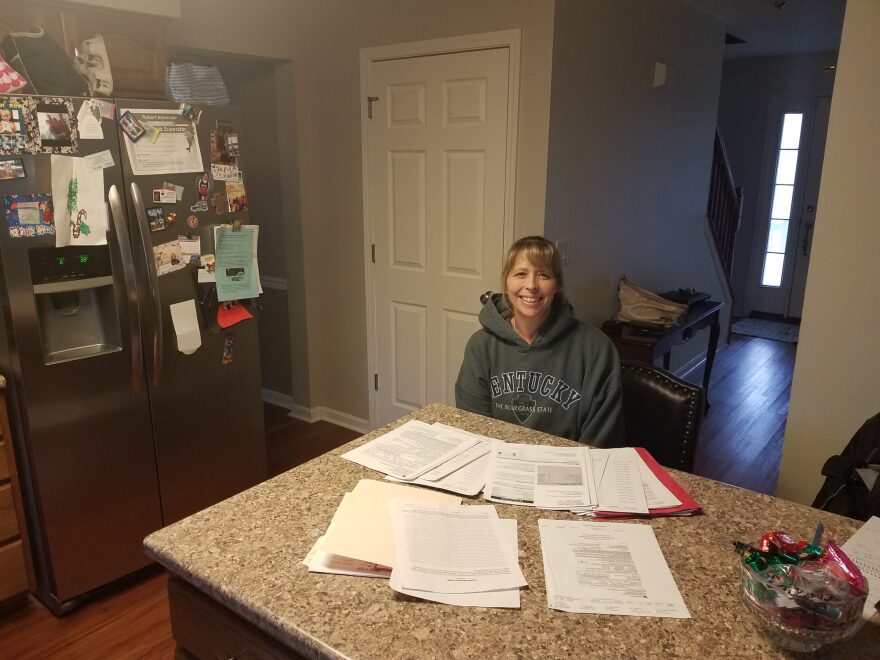Kristin Hurst walked into the Kentucky lottery office in Lexington in May of last year expecting to claim a $1,000 prize from a scratch-off lottery ticket.
Instead, the lottery employee told Hurst there was a red flag on her account. From the parking lot, she made a nervous call to her fiancé. It was his ticket she was trying to cash in, but something was wrong. She had to go to the main Kentucky lottery office to find out what.
An official there told Hurst she and her fiancé wouldn’t see any of the prize money. The Kentucky Department of Revenue intercepted it.
Her luck gave the state the opportunity to collect a portion of a $3,100 medical bill from a trip, eight years prior, to the University of Kentucky’s Chandler Hospital.
Hurst, who lives in Lexington, was shocked and embarrassed. She had been working diligently over the past few years to pay off other debts and keeping a close eye on her credit score but, until that moment, she says she had no idea she owed anything to the hospital.
“If I had known, I could have been doing something about it,” Hurst said. “I hadn’t gotten anything in the mail, no type of contact. Nothing.”
She and her fiancé didn’t have extravagant plans for the money — just help covering bills and taking care of their two kids. She thought the lottery ticket would solve their problems for a little while. “But nope,” Hurst said. “It’s gone. They took it.”
And it’s far from over. The Department of Revenue tacked on a 25% collection fee, and interest ranging from 5 to 7% over the last nine years.
Thanks to interest and fees, Hurst’s outstanding debt ballooned from about $3,100 to more than $5,000 before she found out about it.
Each year, the Department of Revenue collects on unpaid medical bills from tens of thousands of UK hospital patients like Hurst. They seize state tax refunds, confiscate lottery winnings or garnish paychecks — methods private bill collectors couldn’t use without a court order.
Some patients don’t know they owe the money, or thought their insurance had paid the bill. Others simply can’t afford to pay.
The practice may face renewed scrutiny as more and more Kentuckians seek medical care for the coronavirus. Kentucky had confirmed 22 positive cases as of Monday evening, including one death. UK’s Chandler hospital treated at least one coronavirus patient. In response to a question at a press conference on Monday, Governor Andy Beshear said he did not want to see wage garnishments at this time and would talk to the revenue department about the process.
UK spokesman Jay Blanton told KyCIR in February that unpaid bills can impact the cost of care for everyone.
“We need to make a good faith effort and have a comprehensive process for trying to collect payments for the health care that's provided,” Blanton said. “Whether that's through the Department of Revenue or a third party, in some ways, doesn't matter. We need to make every effort in a good faith manner to collect that debt.”
UK HealthCare is the only hospital system in Kentucky tapping the Department of Revenue to collect its debts. While debtors might battle bill collectors and lawsuits from other hospitals, UK hospital patients face the much more powerful state.
The arrangement is mutually beneficial: UK HealthCare can avail itself of the state’s far-reaching debt collection tools. State government gets a revenue boost from the added interest and collection fees.
State data show that it has collected $76 million from patients this way since 2009. Most went back to UK HealthCare to pay for medical bills. But the state kept $18 million for itself. That includes $4 million in interest that has been added to the commonwealth’s general fund.
Kentucky charges the highest interest rate and penalty of any state that collects medical debt this way, according to a KyCIR review of collection policies.
A recent investigation by the Charleston Post and Courier found that 13 states allow certain hospitals to use the state’s debt collection tools to collect on medical debts. KyCIR contacted each of those states.
In neighboring Ohio, for example, patients are charged a 5% fee by the attorney general’s office for collection costs. (Only one state-affiliated hospital, at the University of Toledo, adds 5% interest.) In Iowa, the agency that submitted the debt to the Department of Revenue for collection pays the fees, not the debtor.
April Kuehnhoff, a staff attorney at the National Consumer Law Center specializing in debt collection, said Kentucky’s interest and fees significantly increase the cost to vulnerable consumers. “If you are adding a flat fee like 25%, that fee is not at all related to the overall cost of collection,” Kuehnhoff said. “[It’s] really just a punitive fee being assessed without any regard for the ability to pay.”
Department of Revenue spokesperson Jill Midkiff said in an emailed statement that the Department of Revenue performs collection services for a variety of executive state agencies.
Midkiff said the department doesn’t set the fees or interest rate: the legislature does.
Hurst was living in her car in September of 2011, working for minimum wage at a Sbarro pizza shop when the hospital says her debt originated. She doesn’t know if she actually went in September, but remembers that health issues sent her to the emergency room a few times that year, usually to treat allergic reactions so severe that her throat would swell shut.
Hurst said she chose UK’s Chandler hospital specifically because she didn’t have insurance and knew the hospital offered charity care to treat low-income, uninsured patients. Each visit, she said she requested charity care and left with the understanding that she wouldn’t owe the hospital anything.
On March 9, Hurst received a letter from the Department of Revenue informing her that her $75 tax refund was withheld to put towards the debt. The letter came with instructions on how to pay online and says that interest will keep accruing until the balance is paid in full. Kentucky had declared a state of emergency over the coronavirus three days earlier.
Hurst says she will pay the hospital any money she truly owes.
What bothers her is the lack of communication and the fact that the university hospital seemingly made no effort to contact her until the debt had grown so large — and she walked into a lottery office with a ticket worth $1,000.
Blanton of UK said the hospital couldn’t discuss individual cases but the billing office makes multiple attempts to contact each patient.
Although Hurst was homeless at the time of the visit, she had a stable address soon after. Other creditors sent certified mail, Hurst said.
A full time student, Hurst has no income at the moment. But she’s set to graduate from the University of Louisville with a degree in social work this spring. She’s worried about what this debt could mean for her future after fighting for so long to get back on her feet.
“I've come this far and now I'm terrified,” she said. “I'm not rich by any means, so when that little state refund comes back or if they threaten my paychecks, it would take a long time to pay off.”
Unforeseen Consequences
UK HealthCare — the brand name for the University of Kentucky’s healthcare system that includes four hospitals and other medical facilities — brought in $1.65 billion in revenue from patient services in the 2019 fiscal year.
The vast majority of this comes from payments from patients’ insurance providers. When patients are uninsured or if insurance won’t cover their treatment, they have 120 days to pay the hospital. After that the debt is serviced by Central Kentucky Management Services. Inc., the entity responsible for billing and administration of debts to UK HealthCare.
If the management service is unable to collect the debt, it is transferred to the Kentucky Department of Revenue, which adds the fees and interest.
The 25% collection fees go to the agency’s Enterprise Collection program. It collects debt for other state agencies, but UK medical debt alone brought in nearly $2 million in the 2019 fiscal year. State records show running the whole program cost $1.5 million that year.
The interest rates and collection fees the agency collects are set by state law that derives from an attempt to consolidate Kentucky state agencies debt collection practices under the Department of Revenue.
The legislation was sponsored by Sen. Damon Thayer and former Rep. Harry Moberly, Jr in 2004. It required all state agencies to turn “certified debts” over to the Department of Revenue. The University of Kentucky joined the program two years later in 2006.
Moberly, a Democrat from Richmond, retired in 2011 and says although he doesn’t remember the specific legislation, allowing the University of Kentucky to collect its medical bills using the state government isn’t something he would have done. “I wouldn’t have sponsored and I don't think we would have passed a bill specifically for that intent. That doesn’t mean that it couldn't be within the legal interpretation,” Moberly said. “Sometimes bills have unforeseen consequences that you don't contemplate at the time.”
Thayer, a Georgetown Republican and Majority Floor Leader, did not respond to requests for comment.
“You owe it and you’re gonna pay it”
Kuehnhoff of the National Consumer Law Center said the typical legal process for debt collection allows patients to challenge debts they believe are incorrect or unjust.
Allowing UK hospitals to turn debts over to the Department of Revenue amounts to a “short circuiting” of this process, Kuehnoff said.
“There’s no check, potentially, on the charge that’s being applied to the care,” she said.
Betsy Davis Stone, a health care law fellow at the Kentucky Equal Justice Center, said she regularly hears from patients who haven’t had a chance to challenge what UK HealthCare says they owe and are now facing collection from the state.
“Our state statutes lay out a process for people to be able to challenge debt and currently from talking to UK HealthCare patients we are not convinced that people are getting any part of that process,” Davis Stone said. “The people that are hurt most by these policies are the most vulnerable Kentuckians, the people that can’t afford to pay the big bill just to get UK HealthCare off their back.”
UK spokesperson Blanton said UK HealthCare complies with all federal and state laws.
“We ask the Department of Revenue to intervene and assist only as a last resort, and that's after every appeal and months of attempts have been exhausted,” Blanton said. “I know we’re not perfect. I'm sure people can point to mistakes that were made, but in the main, what you’ve got is a robust, comprehensive, compassionate and sensitive process.”
The final letter Central Kentucky Management Services sends to patients informs them they can appeal their debt by mailing supporting documents within 30 days. Since 2017, those hearings have been conducted by the Kentucky Attorney General’s Office.
The attorney general’s office told KyCIR it has only heard three appeals. One was decided in favor of the patient.
State law says the Department of Revenue can’t collect on debt until appeals or conflicts have already been exhausted, and the department has no appeals process of its own. The department does, however, notify UK HealthCare’s debt collectors when someone disputes their debt. Records show that UK HealthCare has been notified of nearly 600 such disputes since 2016.
Lucy Alexander of Simpsonville tried to dispute her debt to UK after she went to the hospital for surgery to repair a hernia in 2012. Her insurer pre-approved the costly procedure and covered all but her $150 co-pay.
Months later, UK HealthCare sent Alexander a bill for $25,340.
“I was in shock, I was scared,” Alexander said. “I thought ‘this has to be a mistake.’”
A registered radiologic technician, Alexander keeps meticulous records. She has documentation showing Blue Cross Blue Shield originally paid the hospital $21,944 for the procedure.
When she called the hospital, she was told that the hospital was investigating what went wrong and she should call back in two weeks. This process repeated for over a year.
She eventually discovered that the hospital had reimbursed Blue Cross Blue Shield’s payment and then re-billed the company, all without Alexander’s knowledge.
Blue Cross Blue Shield didn’t respond to a request for comment. But Alexander’s records show the company rejected the second claim. By the time she found out, it was too long after the surgery to file an appeal with the insurer. She says she didn’t know she could file an appeal with the hospital directly.
She enlisted the help of the surgeon who performed the procedure, who wrote a letter on her behalf to UK HealthCare and Blue Cross Blue Shield. Neither would budge.
“I felt like I was this little piece of fabric in their big quilt,” Alexander said. “You got nowhere with them. They said this is how it is, you owe it and you’re gonna pay it.”
More than a year after the surgery, Alexander learned the Department of Revenue was collecting her debt when they garnished an entire paycheck.
Federal law prohibits private debt collectors from garnishing more than 25% of someone’s paycheck, and communications from the department say they will only take 10%. But Alexander still has the pay stub.
Midkiff, the Department of Revenue spokesperson, said last month the department could not comment on individual cases, but the accounts of Alexander and the other UK HealthCare patients described in this story “are generally inconsistent with collections law, DOR policy and mathematical calculations.”
Alexander, who is married with two children, had to borrow money from family and her employer to pay bills. She went to the Department of Revenue’s office in Frankfort to ask for help. “They did not want to hear anything about my story,” Alexander said. “They just wanted to know how much I could pay.”
Afraid the state would take another paycheck, Alexander set up a payment plan of $100 every two weeks and hired a lawyer. Alexander said after a few months of work, the lawyer told her there was nothing they could do.
“I fought tooth and nail,” Alexander said. “But you cannot fight with someone who is a billion dollar industry and is backed by the government.”
The state has withheld her tax refunds every year since 2015, ranging anywhere from $350 to $1,900.
“That was our extra money for our kids,” Alexander said.
As of January, the Department of Revenue has collected $19,091 from Alexander according to receipts from the department, three-fourths of her original bill. But she’s nowhere near paying off the debt.
The Department of Revenue has added $11,427. The interest is still accruing.
Tax Season Prime Time For Garnishment
The most sure-fire method the Department of Revenue has to collect debts is by “offsetting” state income tax refunds. That’s why collections spike every spring, when Kentuckians file their taxes and the department confiscates them.
But a court case in Franklin County aimed to put a pause on that practice, at least this tax season. Attorney Doug Richards is representing clients in a class action lawsuit in Franklin Circuit Court which claims the University of Kentucky and the Kentucky Department of Revenue deny patients due process and judicial oversight.
A motion Richards filed on February 12 would, if granted, require the Department of Revenue to follow its own rules for debt collection before it intercepts taxpayer’s refunds. Richards argues that, by sidestepping a thorough appeals process and clear communication with the debtor, the department is not following those rules.
Kentucky's courtrooms are currently closed statewide for a month to slow the spread of the coronavirus. But Franklin Circuit Judge Thomas Wingate could rule still on the motion filed last month. The judge's decision could impact all of the 32,500 accounts the Department of Revenue was servicing on behalf of UK HealthCare as of December.
The collection process violates the Kentucky Constitution, the lawsuit alleges, by “taking of the property of the Plaintiffs and class members, without due process of law.”
“UK essentially acts as plaintiff, judge and jury over whether people owe it money,” Richards said.
Even if the judge acts to stop collections, the relief won’t help UK patients like Bobby King in Richmond.
King had surgery in 2016 to remove a portion of his right leg that was infected with blood poisoning from diabetes. He was working for UK at the time, first as an EMT and then at a desk job when his health began to fail.
After another surgery last April, King had to leave work, and he fell behind on some bills.
King said he was never warned by the hospital that his debt could be transferred to the Department of Revenue.
“I’ve never seen a hospital be able to use a government agency to collect for them before, so whenever I got a threatening letter from the Department of Revenue, it just kind of rocked me,” King said. “These people are threatening to take my home, my vehicle, stuff like that. It’s crazy.”
The debt is around $1,200 with fees and interest. Like most people with chronic medical conditions, King is juggling several medical bills.
But the UK HealthCare debt came with a threat that the state agency might take his property, and that was the final straw. He is in the process of declaring bankruptcy.
Contact Jared Bennett at jbennett@kycir.org.
Correction: The state lottery's headquarters is in Louisville. A previous version of this story incorrectly stated its location.







